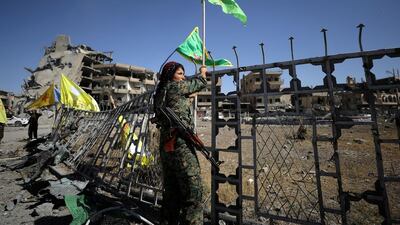Raqqa was once synonymous with Arab syncretism. Rising to the west of the Euphrates River’s confluence with the Balikh River, it expanded over the ages into a hospitable home for a diverse cast of religious communities. Christian monasteries stood alongside magnificent synagogues and one of the most majestic mosques in the world, built in the 8th century under the supervision of the Abbasids. Those who worshipped in the Great Mosque of Raqqa would, if they were brought back to life, be horrified at the so-called “caliphate” that ISIL established in the city in 2014: there was nothing in ISIL’s infernal reign over the city that even remotely reflected the ethos of Islam.
For more than three years, ISIL destroyed Raqqa's cultural and religious heritage and held its people hostage. Naim Square, Raqqa's central thoroughfare, translates into English as "paradise square". Under ISIL, as The National reported on Tuesday, it became hell: the site of regular public executions which civilians were compelled to witness. It was from this imprisoned city that ISIL directed its operations, threatening one day to conquer the whole world.
________________________
Read more
US backed forces liberate Raqqa from ISIL
Naim Square, one of Raqqa’s main roundabouts, became symbol of ISIL brutality
The human cost of leaving Bashar Al Assad in power is before us
________________________
Raqqa's liberation by the US-backed Syrian Defence Forces on Tuesday is one of the most significant victories in the war against ISIL. Coming on the heels of the liberation of Deir Ezzor and Mosul, it signals the beginning of the end of ISIL. But capitalising on these successes is only possible if the causes of ISIL's rise are recognised — and addressed. As this newspaper has long pointed out, ISIL did not emerge in a vacuum. It incubated in the conditions created by the government of Bashar Al Assad.
It is worth remembering that Raqqa's political activists welcomed the routing of Mr Al Assad's forces by opposition fighters in 2013. The international community could have seized that moment by supplying aid to moderate elements. Instead, it abandoned them, enabling ISIL to take over the city within a year. Mr Al Assad has since then used the savagery of ISIL in Raqqa as a convenient foil, exploiting the world's anxiety and anger to furbish his image and present the conflict as a binary choice, a zero-sum game between himself and ISIL.
To buy into that narrative is become complicit in the restoration of the very circumstances that bred ISIL in the first place. It is not a coincidence that September, the month in which in Mr Al Assad's hold on Syria became more secure than at any time in the last six years, was the bloodiest month in 2017: 995 civilians, among them 207 children, were killed by his forces. Those who abandoned Raqqa in 2013 can atone by helping with its reconstruction now. The task is daunting. The US is leading the way, but others must join in. Raqqa can rise once again and become a model for the rest of Syria, provided the world doesn't avert its gaze or make shabby compromises with Mr Al Assad.
Follow The National's Opinion section on Twitter

